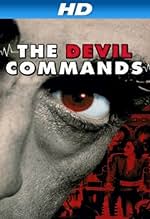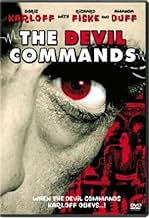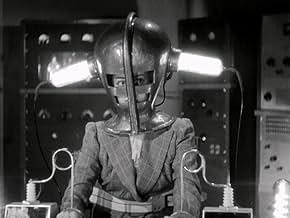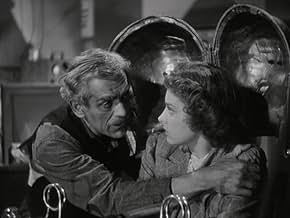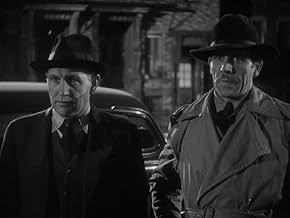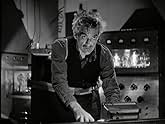IMDb RATING
6.1/10
1.6K
YOUR RATING
Scientist becomes obsessed with the idea of communicating with his dead wife.Scientist becomes obsessed with the idea of communicating with his dead wife.Scientist becomes obsessed with the idea of communicating with his dead wife.
- Director
- Writers
- Stars
Ernie Adams
- Elam
- (uncredited)
Lester Allen
- Dr. Van Den
- (uncredited)
Wheaton Chambers
- Dr. Sanders
- (uncredited)
Earl Crawford
- Johnson
- (uncredited)
Harrison Greene
- Mr. Booth, Bakery Proprietor
- (uncredited)
Erwin Kalser
- Professor Kent
- (uncredited)
Eddie Kane
- Professor Walt
- (uncredited)
George McKay
- Station Agent
- (uncredited)
Al Rhein
- Truck Driver
- (uncredited)
- Director
- Writers
- All cast & crew
- Production, box office & more at IMDbPro
Featured reviews
At last, Karloff has met his match. One glance from the steely-eyed Ann Revere (Mrs. Walters) is enough to freeze even Frankenstein. She doesn't need make-up—she's scary enough just walking onto the set. I'd love to see a stare-down between her and an icy Bette Davis. Anyway, the movie is occasionally atmospheric, especially the cliff house scenes. The plot doesn't make much sense—I guess that's why we get the voice-over narration. It's something about getting brain waves from the dead and turning them into talk. Apparently, that requires that Dr. Blair (Karloff) assemble a junk pile in his laboratory. On special occasions, the metal heaps sit around a table in diving helmets and sort of rock out on brain waves. Then there's the live person who puts on a helmet and sticks neon tubes in her ears. Apparently, that triggers an indoor wind, and then wispy ghost-like things appear. The wind doesn't bother them, but it sure musses-up Karloff's hair. It's one wild and crazy lab scene.
The cast and crew are an interesting bunch. Director Dmytryk was one of the blacklisted Hollywood Ten, who then decided to sing to the House committee, and so, went back to work. On the other hand, Revere never did sing and stayed blacklisted for a decade or so. There's also young Robert Fiske who plays Dr. Sayles. He has the distinction of being one of a handful of movie actors killed in action during WWII— don't they deserve some kind of Hollywood memorial. And between Dorothy Adams (Mrs. Marcy) and the equally familiar Ellen Corby, housekeeper roles stayed monopolized in Hollywood for about twenty years. Nothing special in this 50 or-so minutes, except for the goofy lab scenes. But something should be said for the great Karloff. Even in this routine programmer, he gives it his all, a spirited performance that almost makes the hocus-pocus believable. I hope there's a place in Hollywood heaven for great old pro's like him.
The cast and crew are an interesting bunch. Director Dmytryk was one of the blacklisted Hollywood Ten, who then decided to sing to the House committee, and so, went back to work. On the other hand, Revere never did sing and stayed blacklisted for a decade or so. There's also young Robert Fiske who plays Dr. Sayles. He has the distinction of being one of a handful of movie actors killed in action during WWII— don't they deserve some kind of Hollywood memorial. And between Dorothy Adams (Mrs. Marcy) and the equally familiar Ellen Corby, housekeeper roles stayed monopolized in Hollywood for about twenty years. Nothing special in this 50 or-so minutes, except for the goofy lab scenes. But something should be said for the great Karloff. Even in this routine programmer, he gives it his all, a spirited performance that almost makes the hocus-pocus believable. I hope there's a place in Hollywood heaven for great old pro's like him.
I must confess to a degree of disappointment after having watched "The Devil Commands" the other night, after several years of waiting to do so. The memory of its excellent source novel, William Sloane's "The Edge of Running Water" (1937), is still very much with me from several years ago, you see, and I'm afraid that the film does suffer in comparison. The book has sharply drawn characters, a well-detailed plot (a scientist attempting to communicate with his dead wife), great suspense and a very satisfying windup. The film, unfortunately, has none of these things in much abundance. Still, there ARE some good things to be said for it. Boris Karloff, as usual, is wonderful, as is Anne Revere in her role as his assistant. The effects are more than passable, and, at a mere 65 minutes, there is no unnecessary padding. Indeed, the film can be accused of being not fleshed out enough! Several things aren't explained; even Boris' fate is never clearly shown, unlike his character's amazing finish in the book. This is a story that is truly ripe for a remake, if done faithfully and by a team that respects the source material. Still, I can think of many more fruitless ways to spend an hour than by curling up with "The Devil Commands."
A likable horror/sci-fi (given a catchpenny but utterly meaningless title!) tailor-made for its star despite its naïve approach to the supernatural (what with the goofy laboratory equipment that's a cross between medieval torture devices and an underwater suit!). The Gothic trappings included in the narrative (mystery house, seances, brutish 'zombie' manservant) don't sit too well alongside the scientific paraphernalia and jargon and actually cheapen the film, though not quite to the level of the contemporaneous Bela Lugosi vehicles made by Poverty Row studios!
Perhaps the most perplexing element in the film is the constant narration, which doesn't really serve any purpose: this was probably inspired by Hitchcock's REBECCA (1940) but also, curiously enough, ties it with the fatalistic voice-over that would soon become a film noir staple and we all know what director Dmytryk achieved in that most influential subgenre (in fact, he's easily the best director with whom Karloff worked during his stay at Columbia albeit in an early and, therefore, minor effort); here already, Dmytryk's proficiency for creating mood on a miniscule budget through careful lighting is well in evidence. By the way, I can't say for certain but the cliff setting from where Karloff and Anne Revere dispose of the body of the nosy maid may be the same that was utilized four years later for the climax of a marvelous Grade-B noir, MY NAME IS JULIA ROSS (1945), also a Columbia picture (and which I finally caught up with while in Hollywood early this year)!
Karloff is committed and persuasive as always as the scientist aching to communicate with his dear departed wife a role which eerily predates many Peter Cushing would play in the 1970s (particularly following the death of his real-life wife!); however, the star is matched by co-star Revere as the domineering and vaguely sinister medium. As busy as the climax is, it's rather hurried: what with Karloff trying to convince his daughter's fiancé conveniently, a scientist of the fundamental value of his work but, failing to do so, has to knock him out before he can use his own daughter as guinea pig in his great experiment!; all the while, an angry torch-carrying mob (who seem to have stepped in from the set of some concurrent Universal production!) is hatching up a plan to stall Karloff's 'dangerous' research but, as soon as they're about to storm the place, the whole edifice collapses around them (for reasons that are not entirely clear)!!
While the least effective of the three Karloffs I've just watched for the first time, it's not a bad effort all around and I still look forward to his two remaining (and, oddly, similarly-titled) Columbia vehicles, namely THE MAN THEY COULD NOT HANG (1939) and BEFORE I HANG (1940) though I now know not to expect anything approaching the quality of his genuine classics from the Universal heyday!
Perhaps the most perplexing element in the film is the constant narration, which doesn't really serve any purpose: this was probably inspired by Hitchcock's REBECCA (1940) but also, curiously enough, ties it with the fatalistic voice-over that would soon become a film noir staple and we all know what director Dmytryk achieved in that most influential subgenre (in fact, he's easily the best director with whom Karloff worked during his stay at Columbia albeit in an early and, therefore, minor effort); here already, Dmytryk's proficiency for creating mood on a miniscule budget through careful lighting is well in evidence. By the way, I can't say for certain but the cliff setting from where Karloff and Anne Revere dispose of the body of the nosy maid may be the same that was utilized four years later for the climax of a marvelous Grade-B noir, MY NAME IS JULIA ROSS (1945), also a Columbia picture (and which I finally caught up with while in Hollywood early this year)!
Karloff is committed and persuasive as always as the scientist aching to communicate with his dear departed wife a role which eerily predates many Peter Cushing would play in the 1970s (particularly following the death of his real-life wife!); however, the star is matched by co-star Revere as the domineering and vaguely sinister medium. As busy as the climax is, it's rather hurried: what with Karloff trying to convince his daughter's fiancé conveniently, a scientist of the fundamental value of his work but, failing to do so, has to knock him out before he can use his own daughter as guinea pig in his great experiment!; all the while, an angry torch-carrying mob (who seem to have stepped in from the set of some concurrent Universal production!) is hatching up a plan to stall Karloff's 'dangerous' research but, as soon as they're about to storm the place, the whole edifice collapses around them (for reasons that are not entirely clear)!!
While the least effective of the three Karloffs I've just watched for the first time, it's not a bad effort all around and I still look forward to his two remaining (and, oddly, similarly-titled) Columbia vehicles, namely THE MAN THEY COULD NOT HANG (1939) and BEFORE I HANG (1940) though I now know not to expect anything approaching the quality of his genuine classics from the Universal heyday!
Though the science involved in what Boris Karloff is trying to do is very flawed, in The Devil Commands Karloff gives a very good performance as a man obsessed with contacting his late wife. Unfortunately he falls into the clutches of a fake medium played by Anne Revere who takes advantage of him.
The first few minutes of the film show a happy well adjusted Karloff married to Shirley Warde with daughter Amanda Duff also getting ready to marry scientist Richard Fiske. After a car accident where Warde dies in his arms, Karloff goes off the deep end as he becomes obsessed with the idea that Warde is trying to communicate with him via electrical impulses. His efforts to combine science and the occult lead him to Revere and ultimately to tragedy.
The electrical devices in his laboratory have the familiar Frankenstein like look about them, no doubt Edward Dmytryk in one of his early directorial efforts was trying to capture the mood of the Frankenstein films from Universal. Though the rest of the cast is pretty bland, Karloff and Revere play well off each other and carry the film.
One exception to the blandness is that of Dorothy Adams whom I recognized immediately as Bessie the maid from Laura. Her part here is similar to that one and her acting has some real bite to it.
The Devil Commands is from Columbia's B unit and it's not invested with a lot of production values. Still it's a good horror film from the master himself.
The first few minutes of the film show a happy well adjusted Karloff married to Shirley Warde with daughter Amanda Duff also getting ready to marry scientist Richard Fiske. After a car accident where Warde dies in his arms, Karloff goes off the deep end as he becomes obsessed with the idea that Warde is trying to communicate with him via electrical impulses. His efforts to combine science and the occult lead him to Revere and ultimately to tragedy.
The electrical devices in his laboratory have the familiar Frankenstein like look about them, no doubt Edward Dmytryk in one of his early directorial efforts was trying to capture the mood of the Frankenstein films from Universal. Though the rest of the cast is pretty bland, Karloff and Revere play well off each other and carry the film.
One exception to the blandness is that of Dorothy Adams whom I recognized immediately as Bessie the maid from Laura. Her part here is similar to that one and her acting has some real bite to it.
The Devil Commands is from Columbia's B unit and it's not invested with a lot of production values. Still it's a good horror film from the master himself.
As for another viewer, this film was deposited in my memory banks a generation ago. This morning (4 Sept 2007) the TCM screen stirred that memory, so I taped and replayed the conclusion. The content is thin but the film is short, at least for a grown-up. Karloff is splendid, perfectly absorbed as ever in his character. His role is well supported by the evil medium-familiar woman with regulation severely-pulled-back hair. Dmytryk's touch is in evidence already, as every scene is well composed and lighted.
But the reason why the film stuck in my aging memory, and the only reason for it to attract attention, is the stunningly realized seance scenes at the end. As other posters have described, this isn't just any seance: most of the participants have already crossed over, but they look bewitchingly cool sheathed in deco metal suits. (Another poster called them diving suits, but more like space suits you'd find on the covers of Amazing Tales in that era.) In classic seance style, all these suited bodies are seated around a table.
As in Frankenstein and so many other movies since, the action in the lab scene mostly involves turning up the juice, which pours through the whole interlinked seance, adding a lot of hypnotic background noise. (And can be defended historically, since Spiritualists often used electro-magnetic metaphors to describe their rapport.)
What happens then testifies to a lesson later film-makers probably can't re-learn: nothing is more suggestive than restraint. In two concluding scenes where Karloff finally gets the experiment up and running the way he planned, this well-built seance scenario comes to partial but mesmerizing life. A spinning vortex appears at the bodies' center. The voice of Karloff's dead wife breaks through in a grinding electronica: "Julian!"
Then a lovely, unpredictable action: the seance cadavers in their space suits move ever so slightly, bowing toward the vortex in a series of click-actions. Then, when the electricity ceases, they click back into upright postures. Just as the Karloff character hears his wife's voice, something strangely suggestive of life beyond death occurs. The scene lasts only seconds but is repeated for the mob-finale. It's like an Eric Clapton solo, where you're touched less by what is actually played than all that might have been played. The performance stops at its peak moment, launching the audience's imagination in a way that extensions of the scene could never have accomplished.
But the reason why the film stuck in my aging memory, and the only reason for it to attract attention, is the stunningly realized seance scenes at the end. As other posters have described, this isn't just any seance: most of the participants have already crossed over, but they look bewitchingly cool sheathed in deco metal suits. (Another poster called them diving suits, but more like space suits you'd find on the covers of Amazing Tales in that era.) In classic seance style, all these suited bodies are seated around a table.
As in Frankenstein and so many other movies since, the action in the lab scene mostly involves turning up the juice, which pours through the whole interlinked seance, adding a lot of hypnotic background noise. (And can be defended historically, since Spiritualists often used electro-magnetic metaphors to describe their rapport.)
What happens then testifies to a lesson later film-makers probably can't re-learn: nothing is more suggestive than restraint. In two concluding scenes where Karloff finally gets the experiment up and running the way he planned, this well-built seance scenario comes to partial but mesmerizing life. A spinning vortex appears at the bodies' center. The voice of Karloff's dead wife breaks through in a grinding electronica: "Julian!"
Then a lovely, unpredictable action: the seance cadavers in their space suits move ever so slightly, bowing toward the vortex in a series of click-actions. Then, when the electricity ceases, they click back into upright postures. Just as the Karloff character hears his wife's voice, something strangely suggestive of life beyond death occurs. The scene lasts only seconds but is repeated for the mob-finale. It's like an Eric Clapton solo, where you're touched less by what is actually played than all that might have been played. The performance stops at its peak moment, launching the audience's imagination in a way that extensions of the scene could never have accomplished.
Did you know
- TriviaCompleted December 1940, released February 3, 1941.
- GoofsDr. Julian tells Mrs. Walters she had 10,000 volts pass through her body. Volts do not flow or pass, amps do.
- Quotes
Dr. Julian Blair: Anne dear, your mother is not dead, not really. She's come back to me!
- ConnectionsFeatured in Hollywood and the Stars: Monsters We've Known and Loved (1964)
- How long is The Devil Commands?Powered by Alexa
Details
- Release date
- Country of origin
- Language
- Also known as
- Más allá de la tumba
- Production company
- See more company credits at IMDbPro
- Runtime
- 1h 5m(65 min)
- Color
- Aspect ratio
- 1.37 : 1
Contribute to this page
Suggest an edit or add missing content


